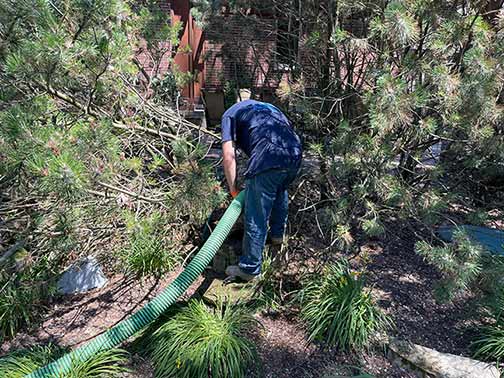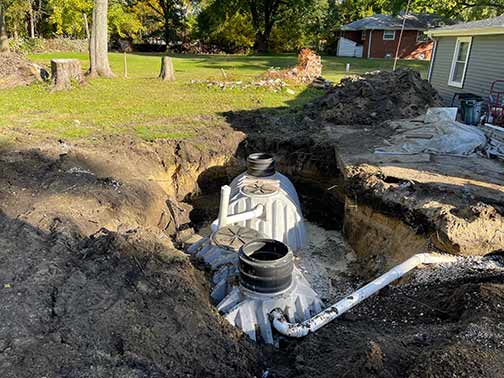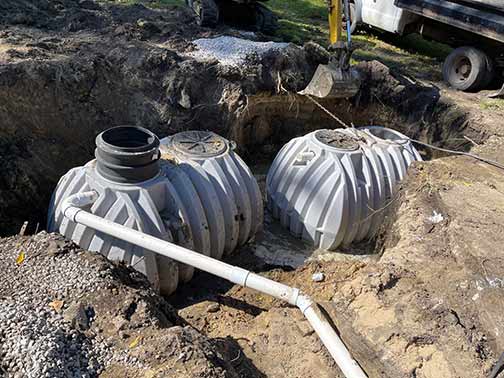
Septic tanks play a crucial role in managing household wastewater in many homes across Illinois. Ensuring their proper maintenance is essential to avoid costly repairs, environmental hazards, and health risks. Below we get into the significance of regular septic tank maintenance, highlighting the benefits of routine care and the potential consequences of neglect.
The Role of Septic Tanks in Waste Management
Septic tanks are underground wastewater treatment structures commonly used in rural areas without centralized sewer systems. They are designed to treat and dispose of household wastewater on-site. The primary function of a septic tank is to separate solids from liquids, allowing the effluent to be safely absorbed into the soil. Properly functioning septic systems are vital for maintaining sanitation and protecting the environment.
The Critical Benefits of Regular Septic Tank Maintenance
Prevention of Costly Repairs and Replacements
Regular maintenance of septic tanks can prevent expensive repairs and replacements. Over time, solids accumulate in the tank, reducing its capacity and efficiency. Without periodic septic pumping and cleaning, these solids can clog the system, leading to backups and overflows. Routine maintenance helps identify and address minor issues before they escalate into major problems, saving homeowners significant repair costs. Moreover, the cost of regular maintenance is relatively low compared to the expenses associated with major repairs or system replacements. By investing in routine upkeep, homeowners can ensure the long-term functionality and reliability of their septic systems.
Environmental Protection and Conservation
Properly maintained septic systems play a crucial role in protecting the environment. When septic tanks are neglected, untreated wastewater can contaminate groundwater, surface water, and soil. This pollution can harm local ecosystems, wildlife, and even human health. Regular maintenance ensures that the system functions correctly, preventing harmful pollutants from entering the environment and preserving the natural beauty of Illinois. Additionally, maintaining a septic system helps conserve water by ensuring that the effluent is properly treated and safely absorbed into the soil. This process protects water resources and supports the sustainability of local ecosystems.
Health and Safety of Residents
Maintaining a septic tank is essential for safeguarding the health and safety of residents. A malfunctioning septic system can release harmful pathogens and bacteria into the environment, posing significant health risks. These contaminants can seep into drinking water sources, leading to waterborne diseases and infections. Regular inspections and maintenance help prevent such hazards, ensuring a safe and healthy living environment for homeowners and their families. Furthermore, a well-maintained septic system reduces the risk of exposure to sewage and other hazardous materials, promoting overall public health and safety.

Potential Risks and Consequences of Neglecting Septic Tank Maintenance
System Failures and Malfunctions
Neglecting septic tank maintenance can result in system failures, causing sewage backups and overflows. These issues can lead to unpleasant odors, property damage, and costly cleanup efforts. In severe cases, a complete system failure may require the installation of a new septic system, which can be a significant financial burden for homeowners. Additionally, system failures can disrupt daily activities and cause inconvenience to residents, further emphasizing the importance of regular maintenance.
Environmental Contamination and Pollution
When septic tanks are not properly maintained, untreated wastewater can leak into the surrounding environment, contaminating soil and water sources. This pollution can have far-reaching consequences, affecting local wildlife, vegetation, and water quality. Contaminated water bodies can become breeding grounds for harmful bacteria and algae, posing risks to both humans and animals. Preventing environmental contamination through regular maintenance is crucial for preserving the natural resources of Illinois and ensuring the well-being of its inhabitants.
Health Hazards and Risks to Public Safety
Failing to maintain a septic tank can create serious health hazards for residents. Sewage backups and leaks can expose individuals to harmful pathogens, leading to various illnesses and infections. Children, the elderly, and individuals with compromised immune systems are particularly vulnerable to these health risks. Regular maintenance helps prevent such health hazards, ensuring a safe and hygienic living environment. Additionally, addressing maintenance issues promptly can prevent the spread of diseases and protect public health.
The Comprehensive Septic Tank Maintenance Process
Regular Inspections and Assessments
Regular inspections are a fundamental aspect of septic tank maintenance. Professional inspectors can assess the condition of the tank, identify potential issues, and recommend necessary repairs or maintenance tasks. Inspections should be conducted at least once every three years to ensure the system’s optimal performance. During inspections, professionals check for signs of wear and tear, leaks, and blockages, ensuring that any problems are addressed promptly. Homeowners should also keep records of inspections and maintenance activities to track the system’s condition over time.
Pumping and Cleaning to Maintain Efficiency
Pumping and cleaning the septic tank is essential to remove accumulated solids and prevent blockages. The frequency of pumping depends on the tank’s size, household size, and water usage. On average, septic tanks should be pumped every three to five years. Regular pumping helps maintain the tank’s capacity and efficiency, reducing the risk of system failures. Additionally, cleaning the tank ensures that it operates effectively, preventing the buildup of sludge and scum that can compromise its performance. Homeowners should work with professional service providers to determine the appropriate pumping schedule for their specific needs.
Maintenance of Drain Fields and Soil Absorption Systems
The drain field, also known as the leach field, is a critical component of the septic system. It is responsible for filtering and dispersing the treated effluent into the soil. Proper maintenance of the drain field includes avoiding excessive water usage, preventing soil compaction, and keeping the area free from tree roots and other obstructions. Regular inspections and maintenance of the drain field ensure its proper functioning and longevity. Homeowners should also be mindful of what they flush down the drains, as certain substances can damage the septic system and affect the drain field’s performance. By following best practices for drain field maintenance, homeowners can extend the life of their septic systems and prevent costly repairs.

Choosing a Professional Septic Tank Service Provider
Experience and Expertise in Septic Systems
When selecting a septic tank service provider, it is essential to choose a company with experience and expertise in the field. Experienced professionals are well-versed in the intricacies of septic systems and can provide reliable maintenance and repair services. They can also offer valuable advice on proper system care and usage. Additionally, experienced service providers are more likely to have encountered a wide range of issues and can handle complex maintenance tasks effectively. Homeowners should seek out providers with a proven track record of success and a commitment to customer satisfaction.
Licensing and Certification for Quality Assurance
Ensure that the septic tank service provider is licensed and certified to perform maintenance and repair work. Licensed professionals adhere to industry standards and regulations, ensuring the quality and safety of their services. Certification from reputable organizations indicates that the provider has undergone specialized training and possesses the necessary skills and knowledge. Homeowners should verify the credentials of service providers to ensure they are qualified to handle septic system maintenance and repairs. Working with licensed and certified professionals provides peace of mind and ensures that the job is done correctly.
Customer Reviews and Testimonials for Reliability
Reading customer reviews and testimonials can provide insights into the reputation and reliability of a septic tank service provider. Positive feedback from satisfied customers indicates a high level of service quality and customer satisfaction. It is advisable to choose a provider with a proven track record of delivering excellent service and maintaining strong customer relationships. Additionally, homeowners can ask for recommendations from friends, family, or neighbors who have had positive experiences with septic tank service providers. By selecting a reputable and reliable provider, homeowners can ensure that their septic systems receive the best possible care.
Summing It Up
Regular septic tank maintenance is crucial for ensuring the efficient and safe operation of septic systems in Illinois. Proper maintenance helps prevent costly repairs, protects the environment, and safeguards the health and safety of residents. By understanding the importance of routine care and choosing a reputable service provider, homeowners can enjoy the benefits of a well-maintained septic system and contribute to the preservation of Illinois’s natural resources. Investing in regular maintenance not only extends the life of the septic system but also promotes a healthier and more sustainable community. Homeowners are encouraged to prioritize septic tank maintenance and work with experienced professionals to keep their systems in optimal condition.

